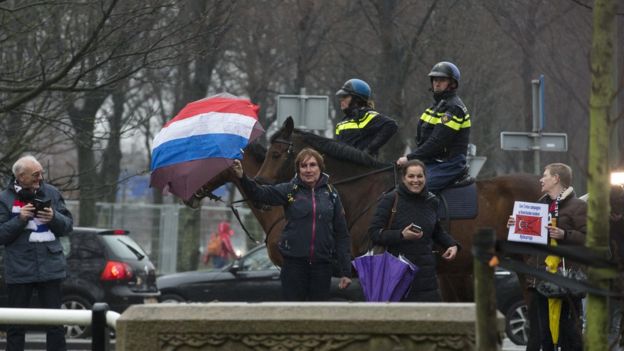Turkish President Recep Tayyip Erdogan has described the Dutch as “Nazi remnants and fascists”, as a diplomatic row grows over a cancelled rally.
The Turkish foreign minister was due to speak in the Dutch city of Rotterdam on Saturday in support of a referendum to give Mr Erdogan greater powers.
But the rally was banned for security reasons, and the minister’s plane was then refused permission to land.
Dutch Prime Minister Mark Rutte said the remark was “way out of line”.
“It’s a crazy remark, of course,” Mr Rutte said.
Turkey has summoned the Dutch charge d’affaires to the foreign ministry in Ankara for an explanation.
In a strange twist, Turkey’s family minister will attempt to travel by land to the Dutch city of Rotterdam, Turkey’s state-run Anadolu news agency said.
Fatma Betul Sayan Kaya is in Germany for separate meetings but plans to head to the Netherlands later, despite having her meetings there cancelled.
‘Reasonable solution impossible’
President Erdogan reacted to the ban on his foreign minister by threatening to block Dutch flights.
He said: “Ban our foreign minister from flying however much you like, but from now on, let’s see how your flights will land in Turkey.”
Foreign Minister Mevlut Cavusoglu also warned Turkey would impose heavy sanctions if his visit were blocked.
Mr Rutte warned in a statement (in Dutch) that the Turkish threat of sanctions made “the search for a reasonable solution impossible”.
Mr Rutte also stressed that Dutch officials had earlier discussed whether the planned rally with Mr Cavusoglu could be private and “smaller-scale” and held in a Turkish consulate or embassy.
The Netherlands “regrets the course of events, and remains committed to dialogue with Turkey,” the statement added.
Analysis – Mark Lowen, Turkey Correspondent
Recep Tayyip Erdogan is a canny political operator. While his falling-out with key European allies and explosive comparisons to the Nazis may seem chaotic, it’s quite possibly all planned by a man who knows he thrives as the underdog.
Sending Turkish ministers to Europe when relations with Turkey are flagging and some European states are nearing elections was never going to be warmly welcomed by the German or Dutch governments.
They rose to the bait – and it has allowed Mr Erdogan to paint this is as a conspiracy against Turkey and himself as the nationalist Turkish hero fending off the European oppressor.
That will rally his support base and the far-right nationalists he’s trying to woo before the presidential referendum next month.
But it will horrify the other side of Turkey – the pro-European liberals who see their country drifting ever further from the west and their President engaging in unprecedented slander against other Nato allies.
The diplomatic row comes just days before Dutch voters go to the polls.
The election campaign has been dominated by issues of identity, the BBC’s Anna Holligan in The Hague says.
The anti-Islam leader of the Freedom Party, Geert Wilders – who campaigned against the Turkish minister’s visit – is expected to make significant gains, our correspondent adds.
Austria, Germany and Switzerland have banned similar gatherings where Turkish officials were due to speak.
 Image copyrightAP
Image copyrightAPMr Erdogan accused Berlin of “Nazi practices”., drawing a sharp response from the German government.
He is seeking to extend his powers in the 16 April vote and targeting millions of expatriate voters – including 1.4 million in Germany.
Rotterdam Mayor Ahmed Aboutaleb said earlier this week that the owner of the hall scheduled to hold Mr Cavusoglu’s event had withdrawn authorisation, but the foreign minister could still visit.
“He has diplomatic immunity and everything so we will treat him with respect, but we have other instruments to prohibit things happening in public spaces,” Mr Aboutaleb said, quoted by Reuters news agency.
There was also uncertainty about whether an event he was due to attend in Zurich, Switzerland, on Sunday would go ahead after one venue refused to hold it.
Another event in Zurich scheduled for Friday was cancelled, as were rallies in the Austrian towns of Hoerbranz, Linz and Herzogenburg.
The Dutch and Austrian governments have also criticised the Turkish government’s drive to take its referendum campaign to Turks based in EU countries.
Relations between Turkey and European countries have deteriorated since last July’s attempted coup in Turkey. Germany has been critical of the mass arrests and purges that followed – with nearly 100,000 civil servants removed from their posts.
Many European nations have expressed deep disquiet about Turkey’s response to the coup attempt and its perceived slide towards authoritarianism under President Erdogan.
Turkey is a key partner in an arrangement attempting to limit the movement of migrants into the EU, but has threatened to “open the gates” if the EU reneges on commitments to provide aid, visa-free travel for its nationals and accelerated membership talks.








